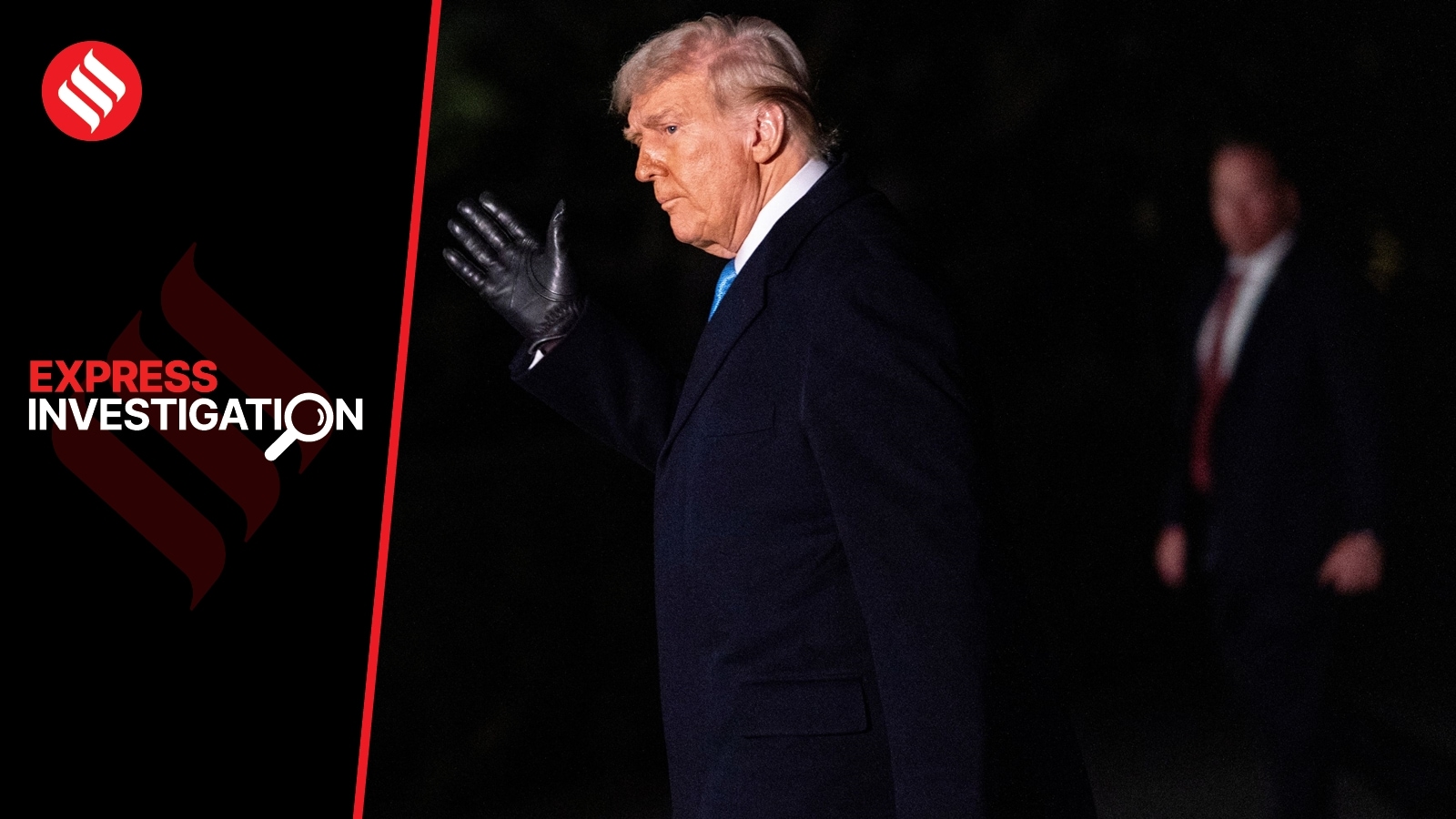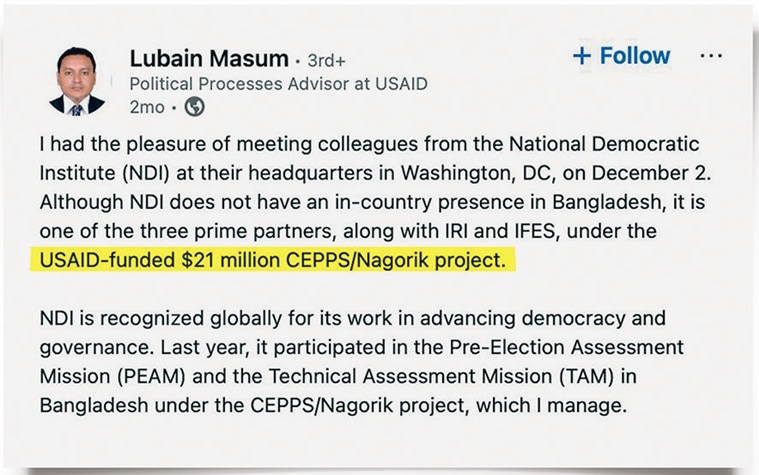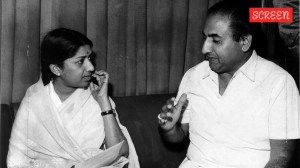SINCE the Trump administration’s Department of Government Efficiency (DOGE) announced February 16 that it had “cancelled,” among a string of projects, USAID funding of “$21 million for voter turnout in India,” the ruling BJP has accused the opposition Congress of using alleged external influence in India’s election process.

Facts show all may have jumped the gun.
That $21 million, records accessed by The Indian Express show, was sanctioned in 2022 for Bangladesh, not India.
Of this, $13.4 million has already been disbursed, ostensibly for “political and civic engagement” among Bangladesh students in the run-up to the January 2024 elections and projects that put a question mark on the integrity of these elections — seven months before the ouster of Sheikh Hasina.
 A December 2024 LinkedIn post by USAID advisor in Dhaka Lubain Masum that confirms million grant through CEPPS.
A December 2024 LinkedIn post by USAID advisor in Dhaka Lubain Masum that confirms million grant through CEPPS.
At the centre of the dispute are two USAID grants on DOGE’s list that were channelled via the Consortium for Elections and Political Process Strengthening (CEPPS), a group based in Washington, DC, which specialises in “complex democracy, rights and governance programming.”
CEPPS was meant to receive a total of $486 million from USAID. This corpus included, as per DOGE: $22 million for “inclusive and participatory political process” in Moldova; and $21 million for “voter turnout in India.”
The first was awarded to CEPPS in September 2016 to “promote” an “inclusive and participatory political process” in Moldova. With Federal Award Identification Number AID117LA1600001 (an ID specific to the grant), this was to run until July 2026 and $13.2 million has been disbursed so far.
Story continues below this ad
The Bangladesh political project
However, the USAID $21-million grant that DOGE flagged was meant for Bangladesh. Consider these:
* Each federal grant comes with a specific place of performance — the country where it is meant to be spent. According to the official open data source of US federal spending, there is no USAID funded CEPPS project in India since 2008.
* The only ongoing USAID grant to CEPPS matching the denomination of $21 million and the purpose of voting was sanctioned — with Federal Award Identification Number 72038822LA00001 — in July 2022 for USAID’s Amar Vote Amar (My Vote is Mine). This is a project in Bangladesh.
* In November 2022, the purpose of this grant was modified to “USAID’s Nagorik (Citizen) Program”. A USAID Political Processes Advisor in Dhaka confirmed this on social media while on a US visit in December 2024: “The USAID-funded $21 million CEPPS/Nagorik project… which I manage.”
Story continues below this ad
Meant to run for three years until July 2025, this grant has already spent $13.4 million, records show.
Between July 2022 and October 2024, this $21-million grant was split into six sub-grants: two each for three CEPPS member organisations International Foundation for Electoral Systems (IFES); International Republican Institute (IRI); and National Democratic Institute (NDI).
IFES is based in Arlington, Virginia; IRI and NDI have their headquarters in Washington, DC.
When contacted, an IFES spokesperson declined to comment.
Queries sent to NDI and IRI remain unanswered.
Campaign material and social media posts show how some of these sub-grants were spent in Bangladesh.
‘Generous’ support: opinion poll to democracy sessions
On September 11, 2024, a month after Sheikh Hasina’s ouster on August 5, the Micro Governance Research (MGR) program of the University of Dhaka and MGR’s director associate professor Aynul Islam posted two near-identical messages on Facebook and LinkedIn.
Story continues below this ad
Under the header “It’s Not Suddenly ‘Spring’! “Hello Bangladesh 2.0”, the posts credited “544 youth events and programs in the university campuses across Bangladesh” organised in two years since September 2022 “to promote youth democratic leadership and civic engagement that directly reached 10,264 university youth through 221 action projects and 170 democracy sessions, among others!”
Islam clearly acknowledged that “all these were possible with the generous support and partnership from the IFES and USAID Bangladesh under the #Nagorik program.”
Islam is a Senior Consultant (Civic and Youth Engagement) with IFES. In December 2024, he became the founding director of Applied Democracy Lab (ADL), established at the University of Dhaka “with the support from USAID and IFES,” according to Islam.
On January 8, 2025, days before it was wound up, USAID Bangladesh had posted on Facebook: “Excited to partner with the University of Dhaka to unveil the new Applied Democracy Lab (ADL).”
Story continues below this ad
When contacted by The Indian Express, speaking over the phone from Dhaka, Islam confirmed that USAID funded the Nagorik programme through CEPPS.
On the cancellation announced by DOGE, he said: “This is a setback but the lab is within the university setup and we are hopeful it will continue.”
Asked about his LinkedIn post on the impact of USAID’s Nagorik program in setting the stage for political change in Bangladesh, Islam said: “It may not be right to directly link the two. I played a small role on behalf of IFES in creating democratic awareness among students but the main component of the Nagorik program was carried out by IRI, and also NDI (member organisations of CEPPS that received the funds).”
That’s not all.
After visiting NDI headquarters in Washington DC on December 2, 2024, USAID’s Political Processes Advisor in Dhaka Lubain Chowdhury Masum, in a post on LinkedIn, confirmed the $21-million USAID commitment: “Although NDI does not have an in-country presence in Bangladesh, it is one of the three prime partners, along with IRI and IFES, under the USAID-funded $21 million CEPPS/Nagorik project. NDI… participated in the Pre-Election Assessment Mission (PEAM) and the Technical Assessment Mission (TAM) in Bangladesh under the CEPPS/Nagorik project, which I manage.”
Masum did not respond to a request for comment.
Story continues below this ad
Reports published by NDI and IRI show that they jointly conducted the PEAM and TAM in Bangladesh “to monitor potential electoral violence conditions before, during, and after the country’s January 7, 2024 parliamentary elections.”
Critique of Awami League
The final NDI-IRI TAM report published in March 2024 noted: “Many stakeholders made credible accusations that state security services and other government institutions at times unevenly enforced election rules to favour the ruling Awami League. The scale of the government’s efforts to arrest opposition members and restrict or disrupt opposition political activities was not satisfactorily justified and generated a widespread perception of politicized law enforcement during the election period.”
IRI also held a nationwide opinion poll in Bangladesh in August 2023 that showed a majority of Bangladeshis believed the country was “headed in the wrong direction.”
DOGE’s list of cancelled grants also included a $29.9-million USAID funding to Democracy International (DI) for “strengthening the political landscape in Bangladesh.” Awarded in 2017, this grant was to be concluded in October 2025. DI’s Dhaka office declined to comment.
Story continues below this ad
While USAID and CEPPS have closed their websites, DOGE has not responded to a query posed on X (formerly Twitter).
When contacted, an official of the Ministry of External Affairs declined to comment.
A spokesperson for the Bangladesh High Commission in Delhi declined to comment on specific USAID programs but said: “USAID has long been a key development partner for Bangladesh, providing aid to enhance various service sectors related to governance and to promote democracy. Last September, USAID signed a development agreement worth over $200 million with the interim government. However, under President Trump’s new policy, the US government is re-evaluating USAID’s funding across the globe. The interim government hopes that the Trump administration will reconsider this policy shift for the betterment of both Bangladesh and the wider world.”



 A December 2024 LinkedIn post by USAID advisor in Dhaka Lubain Masum that confirms million grant through CEPPS.
A December 2024 LinkedIn post by USAID advisor in Dhaka Lubain Masum that confirms million grant through CEPPS.





























